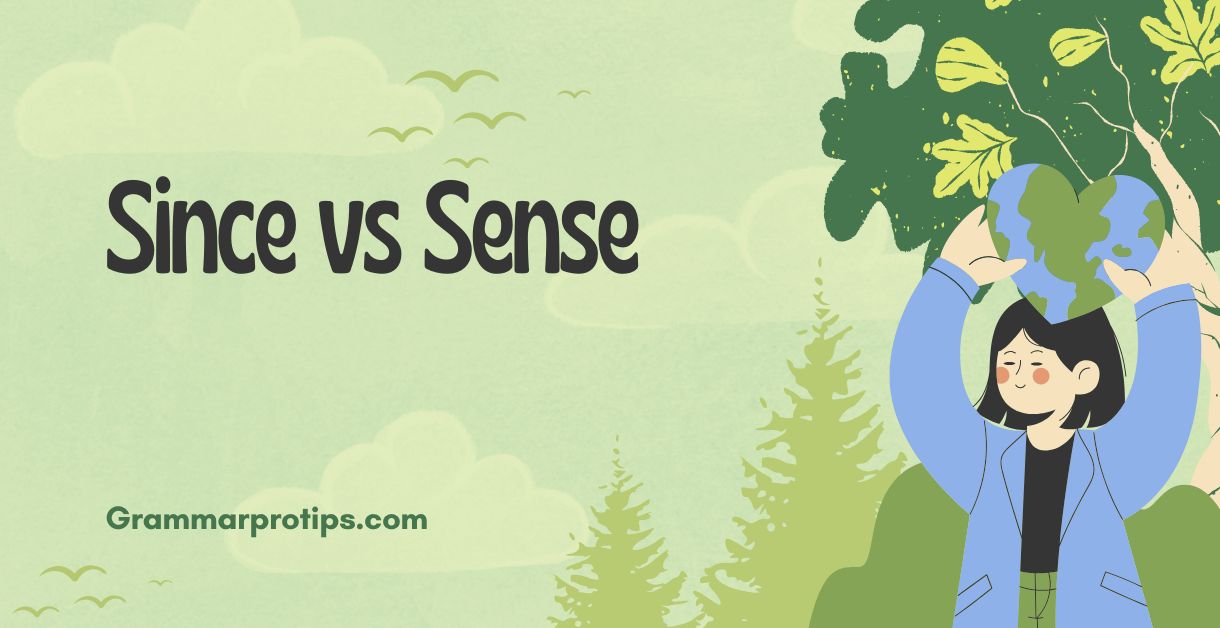The English language is full of words that sound similar, and often, this causes confusion. Two such words are since and sense, which may seem interchangeable at first glance but have distinct uses in both written and spoken contexts.
Understanding the difference between since and sense is essential for mastering your grammar and avoiding common mistakes. This article will walk you through the nuances of since vs sense, providing clear explanations, examples, and helpful scenarios to guide you in knowing when to use each word.
Understanding the Word “Since”
The word since serves multiple grammatical roles in English. It can be used as a preposition, conjunction, or adverb. The most common meanings of since refer to time or causality.
1. Since as a Preposition
When since is used as a preposition, it typically refers to a point in time that marks the beginning of something. It indicates a start or a reference to a past event and is often followed by a time expression.
Example:
I have been living in Chicago since 2010.
Here, since refers to a point in time (2010), marking the beginning of the action of living in Chicago.
2. Since as a Conjunction
As a conjunction, since can indicate cause and effect. It connects two clauses, where one action is the result of another. It can often be replaced with because in this context.
Example:
We decided to leave the party early since it was getting late.
In this case, since shows the reason why the action (leaving early) took place (because it was getting late).
3. Since as an Adverb
When used as an adverb, since describes the passage of time from a particular point. It’s used to convey the duration from the past until the present.
Example:
She hasn’t seen her friend since last summer.
Here, since describes the time between last summer and the present moment.
Understanding the Word “Sense”

In contrast to since, sense primarily refers to perception, understanding, or intuition. It can also describe physical senses like sight, hearing, and taste, or emotional understanding and reasoning. Let’s explore the key uses of sense.
1. Sense as a Noun (Physical Perception)
Sense can refer to the five basic ways humans perceive the world—sight, hearing, touch, taste, and smell. It describes the physical faculties that allow us to experience the world around us.
Example:
The strong smell of cookies filled my sense of smell as I entered the kitchen.
In this case, sense refers to the physical ability to perceive smells.
2. Sense as a Noun (Intellectual Understanding)
Another common meaning of sense is related to logic, reason, or understanding. It’s used to describe mental or emotional perception.
Example:
It makes no sense to argue about something that isn’t important.
Here, sense refers to logical reasoning—the idea of something being rational or not.
3. Sense as a Verb
When used as a verb, sense can mean to perceive or understand something intuitively or with reasoning.
Example:
I can sense that she’s upset, even though she’s not saying anything.
This example shows how sense refers to emotional intuition or understanding.
Difference Between Since and Sense: A Key Grammar Confusion
At first, the difference between sense and since might not seem significant, especially when the words appear in similar contexts. However, their meanings are entirely different.
- Since typically refers to time or cause and is used when expressing duration, a point in time, or causality.
- Sense, on the other hand, is about perception, understanding, or logical reasoning.
Time Reference vs. Perception
- Since refers to time or a point in time: “I have known her since 2015.”
- Sense refers to perception or reasoning: “Her explanation didn’t make sense.”
In this context, since can’t be substituted for sense and vice versa. So, using the wrong word can lead to misunderstandings.
Common Mistakes with Since and Sense
Many English learners and even native speakers sometimes confuse since and sense due to their similar sounds and meanings. To avoid confusion, let’s look at some common grammar mistakes.
1. It Makes Since or Sense?
One of the most frequent mistakes is mixing up makes sense and makes since. The correct phrase is “makes sense,” not “makes since.”
Correct Example:
Her idea for the new project makes sense because it aligns with our goals.
Here, sense means that the idea is logical and reasonable.
2. Since vs. Because
The word since can sometimes be replaced with because when indicating cause. However, it’s important to note that since can also refer to time, so the context matters.
Example 1 (Cause):
I didn’t attend the meeting since I was feeling sick.
I didn’t attend the meeting because I was feeling sick.
Both sentences are grammatically correct, but the word since can sound more formal.
Example 2 (Time):
I haven’t seen her since last weekend.
This example would not work with because, as it refers to a time reference, not a cause.
Sense vs Since: Practical Scenarios

Email Scenario 1: Discussing a Project Timeline
Let’s say you’re writing an email to a colleague about a project deadline. In this case, you might need to use since to indicate a point in time.
Example Email:
Subject: Project Update
Hi Sarah,
I wanted to update you on our progress. We’ve been working on this project since last month and are on track to meet the deadline. We’ll need a few more days to finish the final steps, but I think we’ll be able to submit it by Friday.
Let me know if you need anything else!
Best,
John
In this email, since marks the start of the timeline for the project.
Email Scenario 2: Explaining a Misunderstanding
Now, let’s look at an email where sense is used to explain understanding or logical reasoning.
Example Email:
Subject: Clarifying the Budget Proposal
Hi Emma,
I understand your concerns about the budget proposal, but I think the figures make sense when you consider the additional costs that were factored in. If you’d like, we can review the details together tomorrow to clear up any confusion.
Hope that makes sense.
Best,
Tom
In this case, sense refers to the logical reasoning behind the budget proposal.
Since vs Sense Worksheet
A great way to practice understanding the difference between since and sense is through a worksheet that involves completing sentences with the correct word. Here’s a simple one for you to try:
Fill in the blanks with since or sense:
- I haven’t heard from her _____ last Thursday.
- The idea of taking a vacation _____ really exciting to me.
- He’s been waiting for me at the coffee shop _____ 3 PM.
- Her explanation didn’t make much _____ to me.
- _____ I can remember, we’ve always had a good relationship.
- The project didn’t _____ the first time, but we learned from it.
Conclusion
Understanding when to use since vs sense comes down to understanding their meanings in context. While since often refers to time or causality, sense is more about perception, understanding, and logical reasoning. By keeping these distinctions in mind, you can avoid common grammar mistakes and express yourself more clearly in both writing and speech.
To recap:
- Since = a point in time or a cause
- Sense = perception, logic, or understanding
Whether you’re writing an email or having a casual conversation, mastering the difference between these two words will help you communicate with precision and confidence.
Quick Reference Table: Since vs. Sense
| Word | Function | Example |
|---|---|---|
| Since | Preposition, Conjunction, Adverb | I’ve known her since 2015. / We left since it was late. |
| Sense | Noun (Perception), Noun (Understanding) | He has a good sense of humor. / That doesn’t make sense. |
By following these tips and keeping the differences between since and sense in mind, you’ll be able to master grammar nuances and communicate more effectively.

“Smith is the dedicated admin of [grammarprotips.com], a platform focused on enhancing grammar skills. With a passion for language and education, Smith strives to make grammar accessible and enjoyable for learners of all levels. Committed to delivering high-quality content, Smith continually explores innovative ways to help users master the complexities of grammar.”

